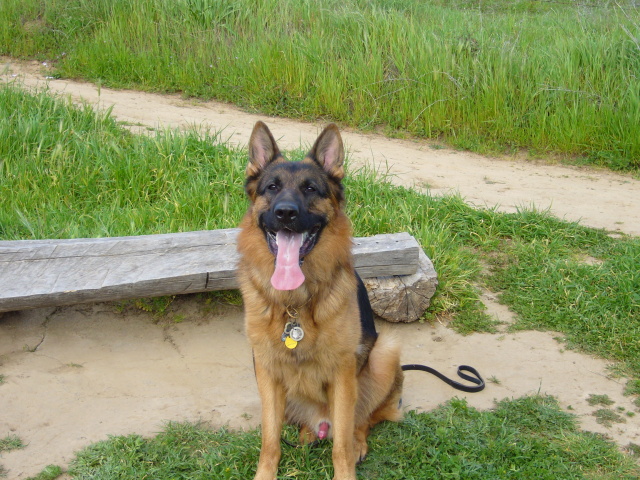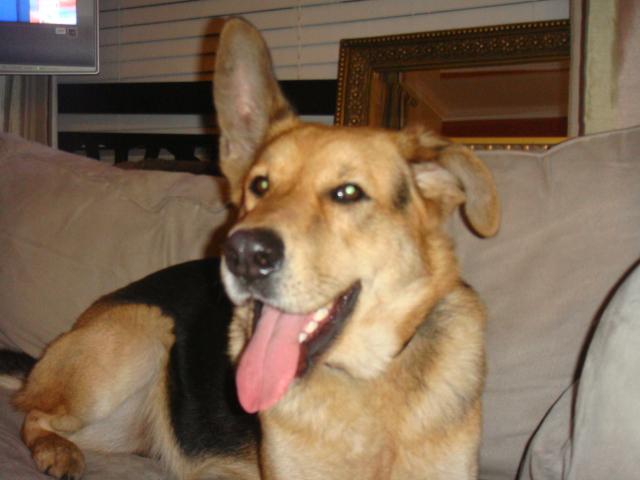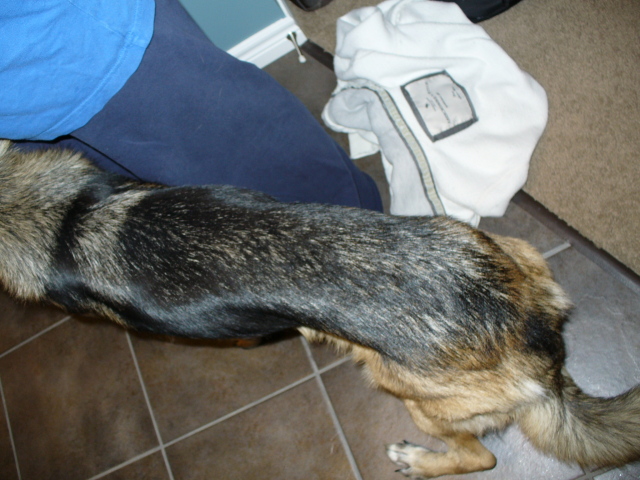QuestionI have a 12 week old GSD female which I got at 8 weeks. she is the second dog in the house with my male lab/pit mix. He is gentle and well trained by using basic techniques in training early on. Please let me know if I am on spot or off base.
1. Biting- When my puppy bit and she did bite, I grabbed her muzzle and gave it a squeeze with a stern- no biting. This action she would bite her toungue a bit and very soon got the message not to bite. At 12 9 weeks she has not bit randomly and when she chews prohibited items, just saying no bite stops her.
2. Eating- at every feeding I feed her second. At first she went for my other dogs bowl but after some correction she will not go there and sits and waits to eat. My other dog will not eat until I give the command to go ahead. This is essential as I cannot have dogs scrambling for the food bowl.
When I feed my GSD, I almost harrass her with my touching and feeling inside her paws/fingers underbelly and ears. My thought is I am training her that she has no area which I cannot touch at a time in which animals do not like to be touched-while eating. I also pull the food away mid eating, stick my hand in the bowl and stop her eating. I feed her from my hands(have to wash them as they get messy) and test her by trying to put my fingers in her mouth with food.
Result- like my other dog, I can touch any paw/ear or part of the dogs body with no resistance or anxiety. I can take food away from my dogs at any time with no issue of growling or resentment.
I do this from the beginning and it may seem extreme but my dogs do not fight, no territory of bowls or food and they have total acceptance of me being their loving master.
Also on the weight issue- my cousing got a GSD dog that around 5 months starting losing weight rapidly. Turned out it is a hormone in the pancrease that ended up they needed a prescription to put in her food. This disease can pop up at any age and I dont hear of anyone bringing this up so I throw it out to bring to your vet as a suggestion. Now that dog gained its weight but with a monthly prescription cost of 50$ for the rest of her life.
All worth it though.
AnswerWhile what you are doing is working, much of the dog training world is moving to more positive methods. Perhaps find and read some of these books:
The Cultural Clash by Jean Donaldson, 1996
Excel-crated Learning by Pamela Reid, 1996
Don't Shoot the Dog, by Karen Pryor, 1996
Surviving Your Dog's Adolescence, by Carol Lea Benjamin, 1993
Second Hand dog, by Carol Lea Benjamin, 1988
Dog Problems, by Carol Lea Benjamin, 1989
Super Puppy, by Peter J. Vollmer, 1988
HELP, Mt dog Has an Attitude, by Gwen Bohnenkamp, 1994
Owners' Guide Better Behavior in Dogs and Cats, by William Campbell, 1989
What All Good dogs Should Know, By Wendy Vollmer, 1991
How to Raise a Dog When Nobody is Home, Jerry Kilmer, 1991
Through Otis' Eyes-Lessons from a Guide Dog Puppy, by Patricia Berlin Kennedy and Robert Christie, 1998
Puppy Primer, by Brenda K Skidmore and Patricia B. McConnell, Ph.D., 1996
Beginning Family Dog Training, by Patricia B. McConnell, Ph.D., 1996
Pancreas problems aren't common, but often come from feeding too much rich human food.

 Aggression
Question
Ray
Hello, I need help...I lost my female GSD
Aggression
Question
Ray
Hello, I need help...I lost my female GSD
 German Shepherd Mix Food
Question
Harley
Hello,
I have a 6 1/2 year old German S
German Shepherd Mix Food
Question
Harley
Hello,
I have a 6 1/2 year old German S
 Shepherd ears/teeth
Question
Rosco
We have just taken in a shepherd that we
Shepherd ears/teeth
Question
Rosco
We have just taken in a shepherd that we
 puppy growing thin and tall
Question
Lying down
Hi, I have a 9 month old German She
puppy growing thin and tall
Question
Lying down
Hi, I have a 9 month old German She
 Very thin German Shepherd
Question
Sadie
Hi
We are having problems getting our
Very thin German Shepherd
Question
Sadie
Hi
We are having problems getting our